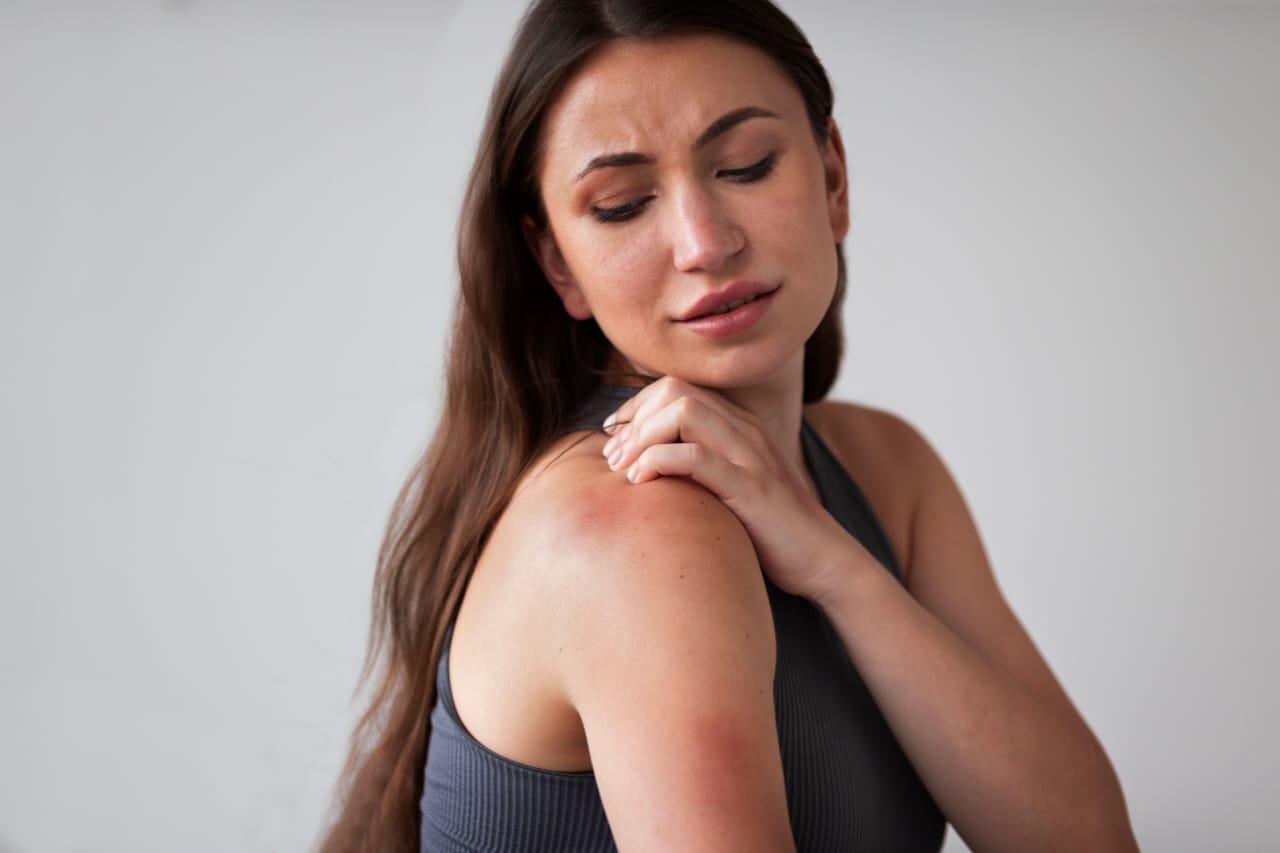- Home
- Skin Disease Treatment in Ayurveda
- VYUMA Ayurveda
- 0 Comments
- July 13, 2023

CONCEPT OF SKIN DISEASE TREATMENT IN AYURVEDA
In Skin Disease Treatment in Ayurveda, the concept of skin disease revolves around the understanding that skin disorders are a manifestation of imbalances within the body. According to Ayurvedic principles, the skin is considered a reflection of the overall health and well-being of an individual. Skin diseases are believed to be caused by the accumulation of toxins (ama) in the body, imbalance of the doshas (Vata, Pitta, and Kapha), impaired digestion, poor lifestyle choices, and emotional disturbances.
Ayurveda views skin diseases as an external expression of internal disharmony. The doshas govern different functions in the body, and an imbalance in any of them can result in various skin conditions. For example, excess Pitta dosha can lead to inflammation, rashes, and excessive heat in the skin, while Vata imbalance can cause dryness, roughness, and cracking. Kapha imbalance may result in oiliness, congestion, and swelling of the skin.
The Ayurvedic approach to skin diseases focuses on identifying and addressing the root cause of the imbalance rather than merely treating the symptoms. This involves restoring the balance of the doshas, eliminating toxins, promoting healthy digestion, and adopting lifestyle modifications. Ayurvedic treatments for skin diseases include Panchakarma therapies, herbal remedies, dietary adjustments, stress management techniques, and lifestyle recommendations to restore optimal health and rejuvenate the skin.
FAQ/ARTICLES INCLUDED/POINTS COVERED
- Concept of skin disease treatment in ayurveda
- Causes of skin diseases according to ayurveda
- Symptoms of skin diseases
- How to diagnose skin disease in ayurveda?
- How to prevent skin disease in ayurveda?
- Ayurvedic management of skin diseases
- Common herbs for skin diseases
- Yoga for skin diseases
CAUSES OF SKIN DISEASES ACCORDING TO AYURVEDA
- Imbalance of the doshas (Vata, Pitta, and Kapha)
- Accumulation of toxins (ama) in the body
- Impaired digestion and poor metabolism
- Weak immune system
- Genetic
- Exposure to environmental pollutants and toxins
- Unhealthy dietary habits and consumption of processed foods
- Excessive stress and emotional disturbances
- Hormonal imbalances
- Infections caused by bacteria, fungi, or viruses
- Allergies and hypersensitivity reactions
- Poor personal hygiene
- Excessive use of chemical-laden cosmetics and skincare products
- Side effects of certain medications
- Excessive exposure to sunlight and harmful UV rays.
SYMPTOMS OF SKIN DISEASES
- Rash or redness on the skin
- Itching or pruritus
- Dry, flaky, or scaly skin
- Swelling or inflammation
- Blisters or vesicles
- Peeling or shedding of the skin
- Skin discoloration or pigmentation changes
- Pain or discomfort in the affected area
- Cracks or fissures in the skin
- Excessive oiliness or greasiness
- Formation of ulcers or sores
- Blistering or oozing of fluid
- Thickening or hardening of the skin
- Sensitivity or tenderness to touch.

HOW TO DIAGNOSE SKIN DISEASE IN AYURVEDA?
In Ayurveda, the diagnosis of a skin disease involves a comprehensive assessment of various factors, including observation of physical symptoms, examination of the skin, analysis of medical history, and assessment of the individual’s overall constitution and dosha imbalance. Here are some common methods used to diagnose skin diseases in Ayurveda:
Visual Observation: The Ayurvedic practitioner carefully examines the skin, looking for specific characteristics such as color changes, texture, rash patterns, presence of lesions, swelling, or any other visible abnormalities.
Examination of Dosha Imbalance: The practitioner evaluates the individual’s dosha constitution (Vata, Pitta, Kapha) and determines if there is an imbalance in any of the doshas that may be contributing to the skin condition.
Assessment of Medical History: Detailed information about the individual’s medical history, including past skin issues, allergies, diet, lifestyle, and family history, is collected to understand the potential underlying causes of the skin disease.
Pulse Diagnosis: Ayurvedic practitioners use pulse diagnosis (Nadi Pariksha) to assess the overall balance and health of the body, including the state of the doshas, which can provide insights into the underlying imbalances causing the skin disease.
Examination of Stool and Urine: The analysis of stool and urine helps in understanding the digestive system’s functioning and identifying any toxins or imbalances that may be contributing to the skin disease.
Assessing the Agni (Digestive Fire): The strength of the individual’s digestive fire (agni) is evaluated, as weak digestion can lead to the accumulation of toxins and contribute to skin diseases.
Prakriti Assessment: Prakriti refers to an individual’s inherent constitution. Understanding the individual’s prakriti helps in identifying the specific imbalances that may be causing the skin disease.
Ayurvedic Questioning: The practitioner asks specific questions related to symptoms, lifestyle, diet, sleep patterns, and emotional well-being to gain a holistic understanding of the individual’s condition.
Based on these assessments, an Ayurvedic practitioner can diagnose the skin disease and determine the appropriate treatment plan, which may include herbal remedies, dietary recommendations, lifestyle modifications, detoxification therapies (Panchakarma), and stress management techniques tailored to the individual’s specific needs.
HOW TO PREVENT SKIN DISEASE IN AYURVEDA?
In Ayurveda, prevention is emphasized as a key aspect of maintaining skin health and preventing skin diseases. Here are some Ayurvedic recommendations for preventing skin diseases:
Follow a Balanced Diet: Consuming a balanced diet that is rich in fresh fruits, vegetables, whole grains, and lean proteins supports overall health and helps prevent skin diseases. Avoid processed foods, excessive sugar, and unhealthy fats as they can contribute to imbalances in the body.
Hydrate Your Body: Drink an adequate amount of water throughout the day to keep your body hydrated. Sufficient hydration helps maintain skin moisture and elasticity, reducing the risk of dryness and related skin conditions.
Practice Proper Hygiene: Follow good hygiene practices to keep your skin clean and free from infections. Regularly wash your face and body using mild, natural cleansers. Avoid harsh soaps or cleansers that can strip away natural oils and disrupt the skin’s balance.
Protect from Sun Exposure: Protect your skin from excessive sun exposure by wearing protective clothing, hats, and using natural sunscreen.
Manage Stress: Chronic stress can have a negative impact on skin health. Practice stress management techniques such as meditation, deep breathing exercises, and yoga to reduce stress levels and promote overall well-being.
Avoid Harmful Chemicals: Minimize the use of chemical-laden cosmetics, skincare products, and harsh detergents. Opt for natural and Ayurvedic formulations that are gentle on the skin and free from harmful chemicals.
Nourish and Moisturize: Keep your skin well-nourished and moisturized by applying natural oils or herbal moisturizers suitable for your skin type. This helps maintain the skin’s natural barrier and prevents dryness and related skin issues.
Practice Abhyanga (Oil Massage): Regularly massage your body with warm herbal oils as per your dosha type. Abhyanga helps nourish the skin, improve blood circulation, and promote overall skin health.
Maintain a Regular Sleep Schedule: Adequate and restful sleep is essential for maintaining healthy skin. Follow a regular sleep schedule and ensure you get quality sleep each night.
Seek Professional Ayurvedic Guidance: Consult with a qualified Ayurvedic practitioner who can assess your individual constitution, provide personalized recommendations, and help you maintain optimal skin health.
AYURVEDIC MANAGEMENT OF SKIN DISEASES
Here are some common Ayurvedic management strategies for skin diseases:
Panchakarma Therapies: Panchakarma is a detoxification and rejuvenation therapy that aims to eliminate toxins from the body and balance the doshas. Specific Panchakarma treatments, such as Vamana (emesis), Virechana (purgation), and Raktamokshana (bloodletting), may be recommended based on the individual’s condition to remove toxins and purify the blood.
Herbal Remedies: Ayurveda utilizes a wide range of herbs with potent medicinal properties to manage skin diseases. Herbs like Neem, Aloe vera, Turmeric, Manjistha, and Triphala are commonly used for their anti-inflammatory, antimicrobial, and antioxidant properties. These herbs can be consumed internally or applied topically in the form of pastes, oils, or decoctions to alleviate symptoms and promote healing.
Dietary and Lifestyle Modifications: Ayurvedic practitioners emphasize the importance of a balanced diet and healthy lifestyle to support skin health. They may recommend a diet tailored to the individual’s dosha imbalance, emphasizing fresh fruits, vegetables, whole grains, and reducing the intake of processed foods. Lifestyle modifications such as stress management techniques (yoga, meditation), proper sleep, regular exercise, and maintaining proper hygiene are also emphasized.
Ayurvedic Medicines: Ayurvedic medicines play a vital role in the management of skin diseases. Tailored formulations known as “Rasayanas” are prescribed based on the individual’s dosha imbalance and specific skin condition. These medicines are prepared using a combination of herbs, minerals, and natural ingredients to purify the blood, boost immunity, and restore skin health from within.
External Therapies: Ayurvedic external therapies can help alleviate skin symptoms and promote healing. Therapies like Abhyanga (oil massage), Udwarthana (herbal powder massage), Takradhara (pouring medicated buttermilk), and Avagaha Sveda (medicated herbal baths) are used to nourish the skin, improve blood circulation, reduce inflammation, and alleviate dryness or itching.
Ayurvedic Skin Care: Ayurveda emphasizes the use of natural, gentle, and chemical-free skincare products. Herbal face packs, herbal pastes, and herbal oils specific to the individual’s skin type may be recommended for cleansing, nourishing, and rejuvenating the skin.
Stress Management: Stress is known to exacerbate many skin conditions. Ayurvedic techniques such as yoga, pranayama (breathing exercises), and meditation are recommended to manage stress levels and promote overall well-being.
COMMON HERBS FOR SKIN DISEASES
- Neem/ Nimba (Azadirachta indica)
- Aloe vera ( Kumari)
- Turmeric (Curcuma longa) / Haridra
- Manjistha (Rubia cordifolia)
- Sandalwood (Santalum album) / Chandana
- Amalaki (Emblica officinalis)
- Lodhra (Symplocos racemosa)
- Haritaki (Terminalia chebula)
- Bibhitaki (Terminalia bellirica)
- Guduchi (Tinospora cordifolia)
- Brahmi (Bacopa monnieri)
- Yashtimadhu (Glycyrrhiza glabra)
- Triphala (A combination of three fruits: Amalaki, Haritaki, and Bibhitaki)
YOGA FOR SKIN DISEASES
Here are some yoga poses (asanas) that are believed to be beneficial for promoting skin health and managing skin diseases:
- Sarvangasana (Shoulder Stand Pose)
- Halasana (Plow Pose)
- Matsyasana (Fish Pose)
- Bhujangasana (Cobra Pose)
- Paschimottanasana (Seated Forward Bend)
- Viparita Karani (Legs-up-the-Wall Pose)
- Adho Mukha Svanasana (Downward-Facing Dog Pose)
- Trikonasana (Triangle Pose)
- Ustrasana (Camel Pose)
- Ardha Matsyendrasana (Half Lord of the Fishes Pose)
- Shavasana (Corpse Pose)
Pranayama (Breathing exercises), such as Kapalabhati and Nadi Shodhana, can also be beneficial for skin health by promoting detoxification and improving oxygenation.
These yoga poses are believed to enhance blood circulation, stimulate the lymphatic system, reduce stress, and promote overall well-being, which can contribute to healthy skin. It’s important to practice yoga under the guidance of a qualified yoga instructor, especially if you have specific skin conditions or any underlying health concerns. They can provide proper guidance on technique, modifications, and sequencing based on your individual needs and abilities.
Ayurveda offers a comprehensive approach to the treatment of skin diseases, addressing the root cause rather than just the symptoms. By adopting Ayurvedic therapies, herbal remedies, dietary modifications, and lifestyle changes, individuals can effectively manage and alleviate various skin conditions. It is important to consult with a qualified Ayurvedic practitioner for an accurate diagnosis and personalized treatment plan. Embracing the holistic principles of Ayurveda can lead to healthier, radiant skin and improved well-being.
At Vyuma Ayurveda Hospital, we understand the impact that skin diseases can have on your well-being and confidence. We know that every individual is unique, and so are their skin conditions. That’s why we provide personalized care to each patient. Our experts take the time to understand your medical history, lifestyle, and specific concerns. This approach allows us to design a treatment plan that suits your requirements, maximizing the chances of a successful outcome.


Leave a Comment